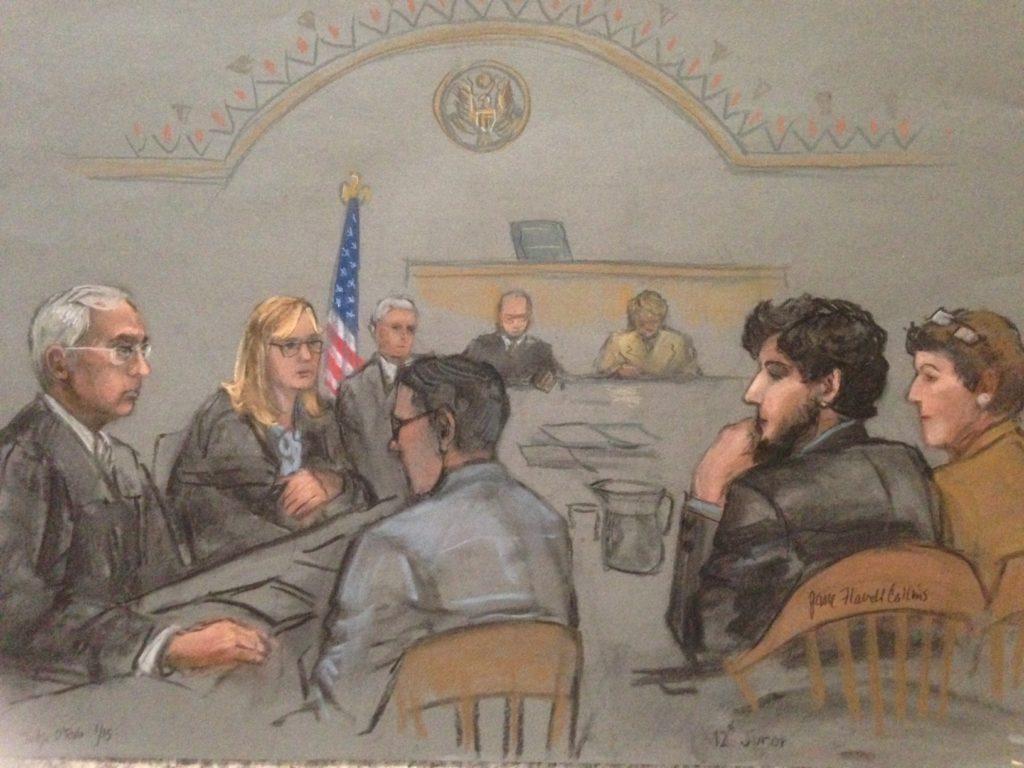By Jose Castillo, news correspondent
As jury selection for the trial of Boston Marathon Bombing suspect Dzhokhar Tsarnaev pushed through an unprecedented fourth week, the defense continued its efforts to move the trial out of Massachusetts.
On Friday, Feb. 13, the defense filed a request to hold an “en banc,” an event in which the defense team would be allowed to present its case for moving the trial elsewhere in front of the six judges of the First United States Circuit Court of Appeals. The request also included a temporary cease in all matters concerning jury selection until the defense could properly present its case to the Court of Appeals.
While the cease was denied, a previously acquired panel of three circuit court judges is set to listen to the defense’s appeal for relocation on Thursday.
The defense’s drive to move the trial elsewhere arises from concerns that hosting the case a few blocks away from Boylston Street, the site where two homemade pressure cooker bombs went off during the 2013 Boston Marathon, might bring about an unwarranted bias and result in the selection of an unfair jury. In the past month, Judge George O’Toole, Jr. has rejected three of the defense’s past attempts to relocate the trial.
In an order released by O’Toole on Feb. 6, the judge defended his jury selection process.
“Contrary to the defendant’s assertions, the voir dire process is successfully identifying potential jurors who are capable of serving as fair and impartial jurors in this case,” O’Toole said in the statement.
The prosecution has fought to keep the trial in Boston, filing requests to prevent the defense from disclosing potential jurors’ information during its appeal to the three-judge panel. However, there has been no ruling on the request.
Despite disagreements as to whether this trial should stay in Boston, both the prosecution and the defense have witnessed strong emotions during the past few weeks, as interviewing potential jurors has revealed scars left on the city’s residents by the bombings.
Interviews on Thursday, Feb. 12 marked a first in the jury selection process, as two potential jurors expressed sympathy towards Tsarnaev. The first candidate expressed understanding regarding the influence his elder brother, the deceased Boston Marathon Bombing suspect Tamerlan Tsarnaev, had on him when they were growing up.
Another potential juror told O’Toole that she could not sentence Tsarnaev to death and expressed grief for the suspect upon learning that the alternative would place Tsarnaev in prison for the rest of his life.
“It’s sad to me that there’s not a chance of parole for him,” the candidate said.
Despite the first instances of sympathy towards Tsarnaev, these cases are overshadowed by the amount of candidates who cannot look past what the 21-year-old suspect has been accused of.
“I feel pretty strongly that [Tsarnaev]’s guilty,” a potential juror told O’Toole. “I would find it hard to believe at this point to find anything that would change my mind.”
Another candidate was similarly firm in his beliefs.
“I think just from what I’ve read and heard and seen prior to being called in as a juror, I think I’ve formed a pretty strong opinion,” he said.
As of last Friday, O’Toole had met with 193 potential jurors. From that pool, he has selected 54 candidates. O’Toole hopes to select 70 total candidates, at which point he will allow the prosecution and the defense to eliminate 31 jurors each, until only 12 jurors and eight alternates are set to sit in on the trial.
O’Toole’s original expected trial start date of Jan. 26 expired due to the general slow pace of interviews and six days of cancellations due to snow. As of now, there is no set date for the start of the trial.
“Barring further weather-related delays, it is anticipated that [jury selection] will be completed in the near future,” court spokeswoman Ginny Hurley said in a statement on Feb. 12. “It is not possible yet to give a precise date when the trial proper will commence, but when we are able to set a reliable date, we will advise you.”
Dzhokhar Tsarnaev, 21, is accused of detonating two homemade pressure cooker bombs on April 15, 2013, during the annual Boston Marathon. The catastrophe resulted in the death of three people and the injury of 260 others.
Illustration courtesy Jane F. Collins









